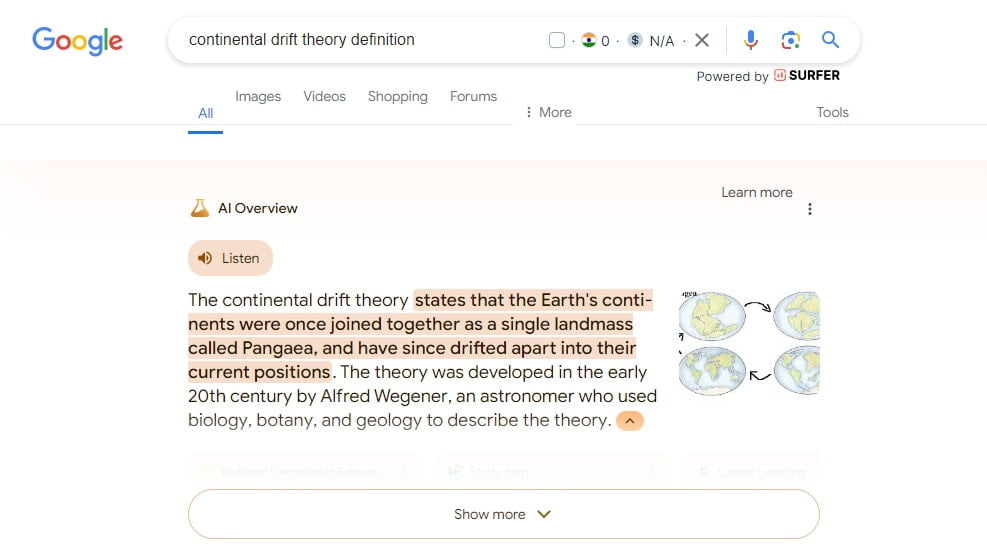Google has launched a new tool called AI Overviews, which gives quick summaries of search results using AI. These summaries, powered by Google’s Gemini language model, show up for specific complex searches where AI can help gather info from various sources.
Highlights:
| Aspect | Details |
|---|---|
| Tool | AI Overviews |
| Purpose | Provides quick summaries of search results using AI |
| Power Source | Google’s Gemini language model |
| Function | Recognizes and synthesizes information from various sources |
| Availability | Automatically enabled for U.S. users, global rollout by the end of 2024 |
| Search Scope | Only specific complex searches trigger AI Overviews |
| User Control | Cannot be entirely turned off; users can click “More” and select “Web” for traditional results |
| Source Linking | AI Overviews include links to source websites for detailed information |
| Publisher Concerns | Potential reduction in traffic to source websites as users may not click through links |
| Extended Features | Android users can join “AI Overviews and More” experiment in Search Labs for more AI features |
| Impact on Google | Shifts from being a gateway to providing direct answers, affecting ad-driven business model |
| Ethical Considerations | Balancing AI Overviews with ad revenue, ensuring fair and safe AI use |
| Competitors | Bing, Perplexity.ai, You.com, Brave Search |
| Competitor AI Use | Bing uses GPT-4 for chat; Perplexity.ai offers direct answers with follow-up queries; You.com provides personalized answers; Brave emphasizes privacy |
| Differences | Google synthesizes overviews selectively; competitors like Bing use extensive dialogue and interactions |
| Privacy Focus | Brave and DuckDuckGo prioritize privacy compared to Google and Bing’s data monetization |
| Future Plans | Gradual increase in AI Overviews availability, exploring conversational AI features |
| User Recommendations | Select search engines based on privacy, personalization, and conversational experiences preferences |
| Conclusion | Google’s expanding AI usage, particularly with Gemini, raises questions about its traditional search model and web relationships. |
Not all searches will trigger these AI Overviews, but they are now automatically enabled for U.S. users. Google aims to introduce this feature globally by the end of 2024.
Currently, users can’t entirely turn off AI Overviews. Yet, you can opt for traditional web links only by clicking on “More” and selecting “Web” in the search results.
The AI Overviews include links to the source websites so you can check more details if you want. However, there’s a concern that users might not click on these links, which could affect the traffic to those websites. If you’re in the U.S. and using an Android device, you can get more AI features by joining the “AI Overviews and more” experiment in Search Labs. This will give you AI Overviews for more searches. Google is now using its Gemini AI model more to directly answer user questions on its platforms instead of just sending users to other websites. This is a big change from how Google typically worked as a gateway to the web. It’s unclear how Google will balance using AI Overviews while still making money from ads by directing users to websites. Sending users to websites is a key part of Google’s business model as a search engine.
What is Google’s AI Overviews feature?

- Google Gemini’s language model powers them, and it can recognize and synthesize information from different sources.
- AI Overviews are currently being tested on a limited subset of complex search queries where generative AI summaries could prove most helpful – not every search query.
- Google previously only made AI Overviews visible to those opting into its Search Generative Experience (SGE) experiment; now, however, some U.S. searches will see them by default, with a global rollout scheduled by late 2024.
- Users currently do not have a way of fully disabling AI Overviews; their only option is to click “More” and narrow their results down to just web results.
- AI-generated summaries link back to the source websites used in their creation, yet there is some concern among web publishers that users might not click through and explore further.
- Google is still exploring ways to present AI Overviews as it gathers input from more than just SGE testers.
- Google will also display ads alongside AI summaries as they experiment with how best to balance this new feature with their advertising-supported business model.
How can I enable or disable Google’s AI Overviews feature?

At present, there is no official way to completely disable AI Overviews on Google Search. By default, they are enabled for U.S. users with plans to roll out worldwide by 2024.
There are, however, ways around AI Overviews:
- Use the “Web” filter tab that appears at the top of search results pages for an alternative view without AI-generated summaries. Clicking this will bring up a traditional results page without AI summaries.
- Install a Chrome browser extension such as “Hide Google AI Overviews” or “Goodbye, Google AI”. These will temporarily hide the AI Overview section on search results pages.
AI Overviews were initially part of an opt-in experiment called Search Generative Experience (SGE) but are now considered core Search features that cannot be entirely disabled in settings.
Android users can gain expanded access to AI Overviews through the “AI Overviews and More” experiment in Search Labs settings. This will display AI Overviews on additional searches beyond their initial rollout.
Google may not offer an official toggle switch to disable AI Overviews entirely; however, using the “Web” results filter or Chrome extensions could help. Expect AI-generated summaries to become an increasingly prominent aspect of search.
How does Google’s AI Overviews feature compare to other AI-powered search engines?

Other AI search engines take differing approaches:
- Bing has integrated OpenAI’s GPT-4 to power its “Bing Chat” feature. Users can engage in extended discussions with Bing’s AI chatbot, asking follow-up questions and receiving detailed, contextual answers that cite sources as well as generate new content.
- Perplexity.ai is an AI-powered search engine designed to deliver direct answers by citing sources, allowing the user to ask follow-up queries or pose further inquiries. The goal is to provide an interactive, dialog-driven search experience.
- You.com specializes in customized answers by employing natural language processing and knowledge graphs to interpret query intent. Furthermore, this site offers personal and private search modes.
- Brave Search stresses privacy by not tracking users or their searches, using its own index and third-party APIs for results. Furthermore, AI features like query Summarizer is being added.
Some key differences:
- Google’s AI Overviews appear selectively, while chatbots like Bing can more widely respond to different queries.
- Google synthesizes overviews from web results, while Bing and Perplexity.ai can conduct back-and-forth dialogue using their language models.
- Brave and DuckDuckGo search engines prioritize privacy, while Google and Bing belong to larger tech companies that monetize user data.
Google is still in the early stages of rolling out AI Overviews, with plans to gradually increase their availability over time. They’re also exploring more conversational AI features to compete with Bing Chat and similar tools, though Google must maintain its core ad-based business model while making decisions based on evidence rather than speculation.
While Google’s AI Overviews provide a quick way to synthesize information quickly, other search engines offer interactive chat and answers powered by AI technology. As Google and others continue rapidly expanding their AI capabilities, the search landscape could undergo major disruption and transformation within a short span. Users should select search engines based on their personal privacy, personalization preferences and conversational experiences when making their selections.
Frequently Asked Questions (FAQs)
What are Google AI Overviews?
Google AI Overviews are AI-generated summaries that appear at the top of search results for certain complex queries, providing users with quick, relevant information by synthesizing key points from top-ranking webpages to provide answers without clicking through multiple links.
How do Google AI Overviews work?
AI Overviews are powered by Google’s advanced Gemini language model. When users enter search queries into Google, its AI systems determine if an AI-generated overview would help in answering them quickly and succinctly. If this is determined to be useful, Google then analyzes and compiles information from relevant high-ranking web pages before creating its summary overview; these sources are then linked and cited within the website.
Who has access to Google AI Overviews?
At Google’s request, AI Overviews were enabled automatically for hundreds of millions of U.S. users beginning in May 2024; global availability will reach over one billion by December 2024. Prior to that time, they were opt-in features exclusive to Search Labs testers.
Can I turn off Google AI Overviews?
As AI Overviews have now become a core Search feature, there is currently no setting to completely turn them off. After conducting a search, you may click the “More” tab and select “Web” to switch back to traditional results pages without AI-generated summaries.
How are Google AI Overviews different from other AI search engines?
While Google provides AI Overviews for complex searches, other AI search engines such as Bing and Perplexity.ai offer more interactive and conversational experiences powered by their language models. Users can ask follow-up questions and engage in dialogue before engaging in more engaging conversation back-and-forth dialogue with AI-generated results rather than traditional web results. Newer AI search engines tend to feature these answers more prominently than their traditional web results.
Will Google AI Overviews impact websites and publishers?
Concerns have been expressed that users could become less likely to click through to actual pages if their information can be found directly in Google’s AI Overviews, leading to decreased website traffic and potentially impacting ad revenues. Google believes its AI Overviews are meant to enhance the search experience rather than replace clicking-through to websites.
How will AI Overviews affect Google’s business model?
Google has traditionally served as a portal to other websites, generating advertising revenue by sending users elsewhere. Now that AI overviews provide more direct answers, it must find a balance between this new user experience and existing business models; to do this successfully, data and feedback about implementation from all areas are needed.
Bottom line
Google is expanding their use of artificial intelligence (AI), particularly its Gemini model, to provide direct answers in search via AI Overviews. While this could become mainstream over time, it raises significant questions regarding Google Search and its relationship to other parts of the web.









